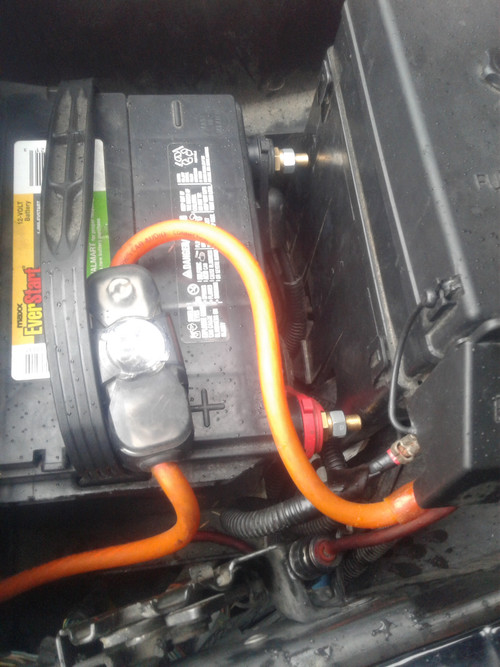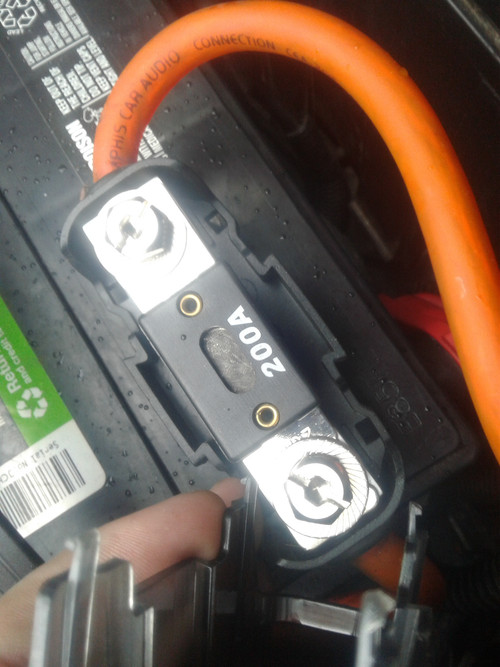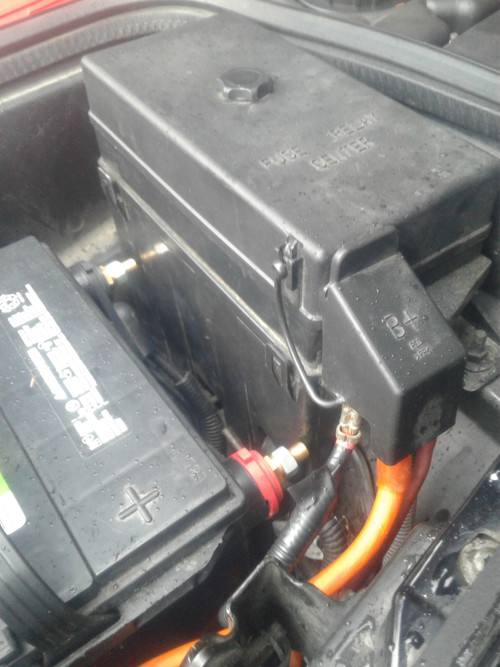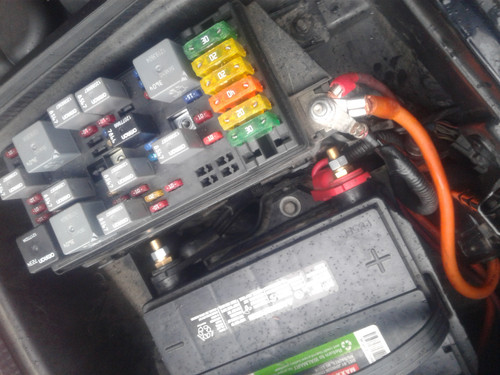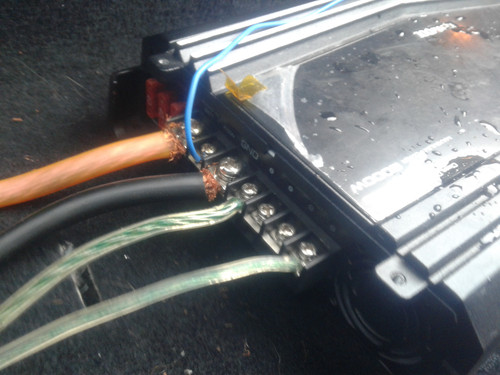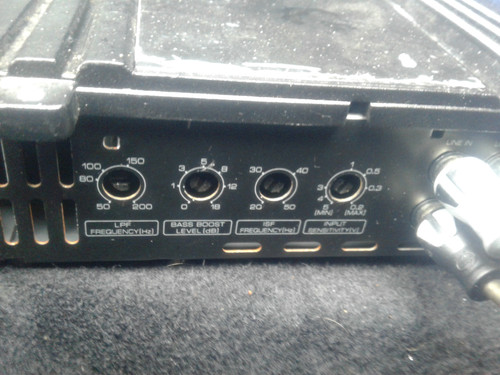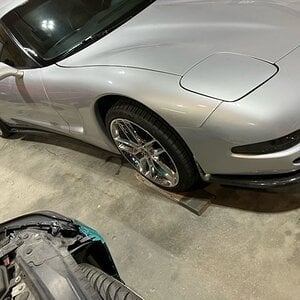Slayer16102
CarAudio.com Recruit
- 34
If I have a single 12" P3SD2-12 thats wired in series to 4 ohms do I use 40.00v (4 ohms) or 28.28v (2 ohms) when setting the gain for that sub with a multimeter.
I know this is the old school method of doing it, but I don't trust doing it by ear to get the best performance out of my subwoofer without exceeding my 400w RMS voltage. I like alot of bass and this way I know I'll never go above 400w when I turn up my audio while cruising.
In my previous thread I said I was having voltage drop issues which I am still trying to resolve, so now I have some more questions to try and narrow this down.
I did not realize before that my 12" dvc subwoofer was not actually running in 2 ohms. I now know the shop hooked it up in series which makes its output 4 ohms.
So under that load my kenwood amp (9106d) can only output 500w x1 RMS at 4 ohms.
So now I have a few questions...
When they installed this in my car they used 0 gauge wire for subs which can only maintain 400w of power and a huge 200A monster block fuse to the fuse box.
Could this 0 guage wire size and the 200A fuse they installed be causing a huge power draw on my cars electrical system? My alternator is 110 amps
Does the fact that my amp has 3 (40A) fuses on it make a difference at all in the power draw on my cars electrical system?
Does that fact they hooked it up to the fuse box and not the battery make any difference at all?
I have looked at other mono amps around the 400-500w RMS range and they usually have a single 20-40A fuse.
If this matters please explain how and why it matters. Again my alternator is only 110 amps
According to kenwoods website the current consumption of the K-9106D is 65A. How does this matter on a car with a 110 amp alternator? Is that a figure for a constant power draw upon my cars 110A charging system no matter what the gain is set at?
Is the kenwood 9106D just way to power hungry for a 110 amp charging system thats all stock? I primarily listen to rap, hip hop, rock, and instrumental rap beats.
If you add up the fuse under the hood thats 200A by itself and if you add up the fuses on the amp itself thats 120A in total fuses on the amp alone. Does that matter when it comes to power consumption of my system what sizes all of those fuses are?
If it is just too much for my car to handle, what is a good amp that you would recommend thats not as power hungry for pushing 400w RMS. The charging system is all stock.
Amp settings:
If my subwoofer is rated for 34-250 Hz with a sensitivity of 85db
What should my LPF dial be set at? The LPF dial ranges from 50-200
What should my ISF frequency be set at? The ISF dial goes from 20 to 50
The subwoofer is installed in a sealed box.
Flattening the system before setting everything:
If I reset my 6800BS back to factory defaults before testing
it sets my EQ to powerful, my fader to 0, my balance to 0, all of my speaker levels to 0,
my crossovers to off, my loudness to off, my bass boost to off, and my SLA to 0.
Should I set the EQ to flat and my subwoofer level to 10 before I set the gain on the amp or should I leave the subwoofer level at 0 [-24-10] at 0 until the gain is set for the targeted voltage I want.
Is it okay to set my front and rear speaker levels back to 5 or should I leave it at 0 while I set the subwoofer gain with a multimeter.
I'm just trying to do this right to resolve the car voltage drop issue, so sorry for all of the crazy questions. I am still very new to this...
Someone told me that I should set up all of my stuff how I like it first "IE" eq, speaker levels, crossovers, loudness, bass boost, sla then set the amp gain while others have said set everything completely flat before doing it. Which is the correct method when setting gain using a multimeter.
I know this is the old school method of doing it, but I don't trust doing it by ear to get the best performance out of my subwoofer without exceeding my 400w RMS voltage. I like alot of bass and this way I know I'll never go above 400w when I turn up my audio while cruising.
In my previous thread I said I was having voltage drop issues which I am still trying to resolve, so now I have some more questions to try and narrow this down.
I did not realize before that my 12" dvc subwoofer was not actually running in 2 ohms. I now know the shop hooked it up in series which makes its output 4 ohms.
So under that load my kenwood amp (9106d) can only output 500w x1 RMS at 4 ohms.
So now I have a few questions...
When they installed this in my car they used 0 gauge wire for subs which can only maintain 400w of power and a huge 200A monster block fuse to the fuse box.
Could this 0 guage wire size and the 200A fuse they installed be causing a huge power draw on my cars electrical system? My alternator is 110 amps
Does the fact that my amp has 3 (40A) fuses on it make a difference at all in the power draw on my cars electrical system?
Does that fact they hooked it up to the fuse box and not the battery make any difference at all?
I have looked at other mono amps around the 400-500w RMS range and they usually have a single 20-40A fuse.
If this matters please explain how and why it matters. Again my alternator is only 110 amps
According to kenwoods website the current consumption of the K-9106D is 65A. How does this matter on a car with a 110 amp alternator? Is that a figure for a constant power draw upon my cars 110A charging system no matter what the gain is set at?
Is the kenwood 9106D just way to power hungry for a 110 amp charging system thats all stock? I primarily listen to rap, hip hop, rock, and instrumental rap beats.
If you add up the fuse under the hood thats 200A by itself and if you add up the fuses on the amp itself thats 120A in total fuses on the amp alone. Does that matter when it comes to power consumption of my system what sizes all of those fuses are?
If it is just too much for my car to handle, what is a good amp that you would recommend thats not as power hungry for pushing 400w RMS. The charging system is all stock.
Amp settings:
If my subwoofer is rated for 34-250 Hz with a sensitivity of 85db
What should my LPF dial be set at? The LPF dial ranges from 50-200
What should my ISF frequency be set at? The ISF dial goes from 20 to 50
The subwoofer is installed in a sealed box.
Flattening the system before setting everything:
If I reset my 6800BS back to factory defaults before testing
it sets my EQ to powerful, my fader to 0, my balance to 0, all of my speaker levels to 0,
my crossovers to off, my loudness to off, my bass boost to off, and my SLA to 0.
Should I set the EQ to flat and my subwoofer level to 10 before I set the gain on the amp or should I leave the subwoofer level at 0 [-24-10] at 0 until the gain is set for the targeted voltage I want.
Is it okay to set my front and rear speaker levels back to 5 or should I leave it at 0 while I set the subwoofer gain with a multimeter.
I'm just trying to do this right to resolve the car voltage drop issue, so sorry for all of the crazy questions. I am still very new to this...
Someone told me that I should set up all of my stuff how I like it first "IE" eq, speaker levels, crossovers, loudness, bass boost, sla then set the amp gain while others have said set everything completely flat before doing it. Which is the correct method when setting gain using a multimeter.
Last edited:

